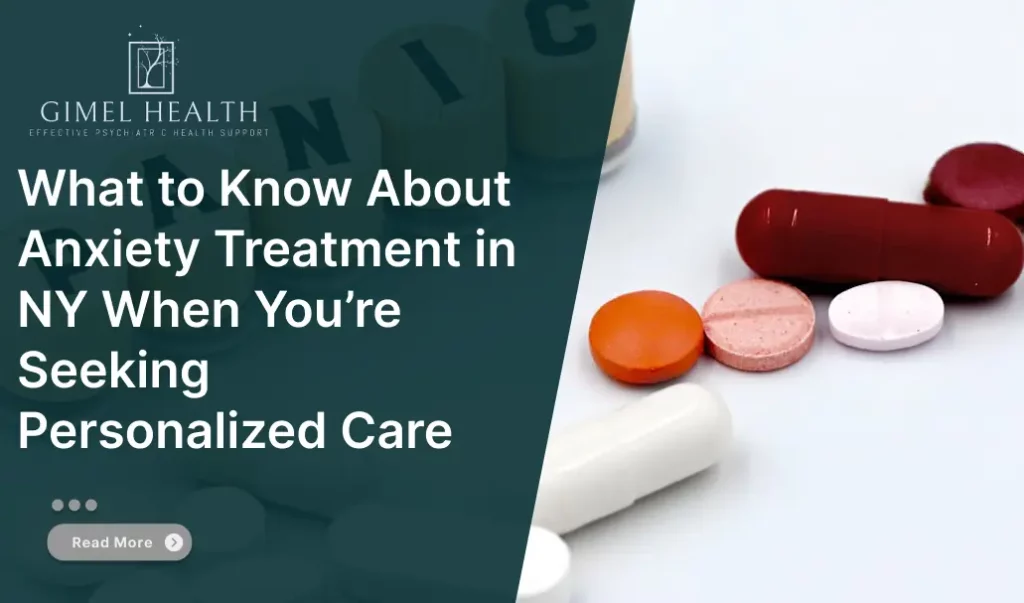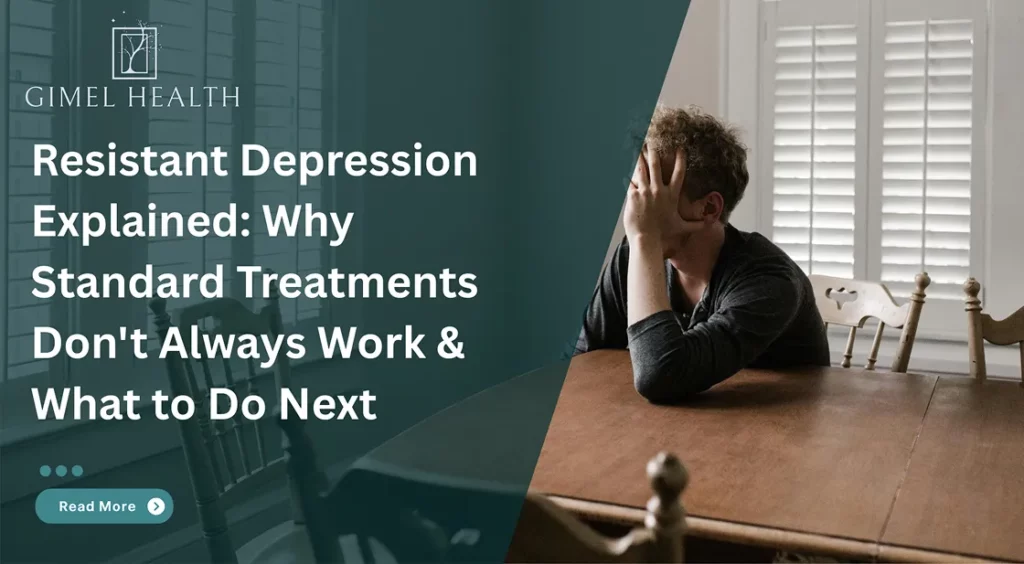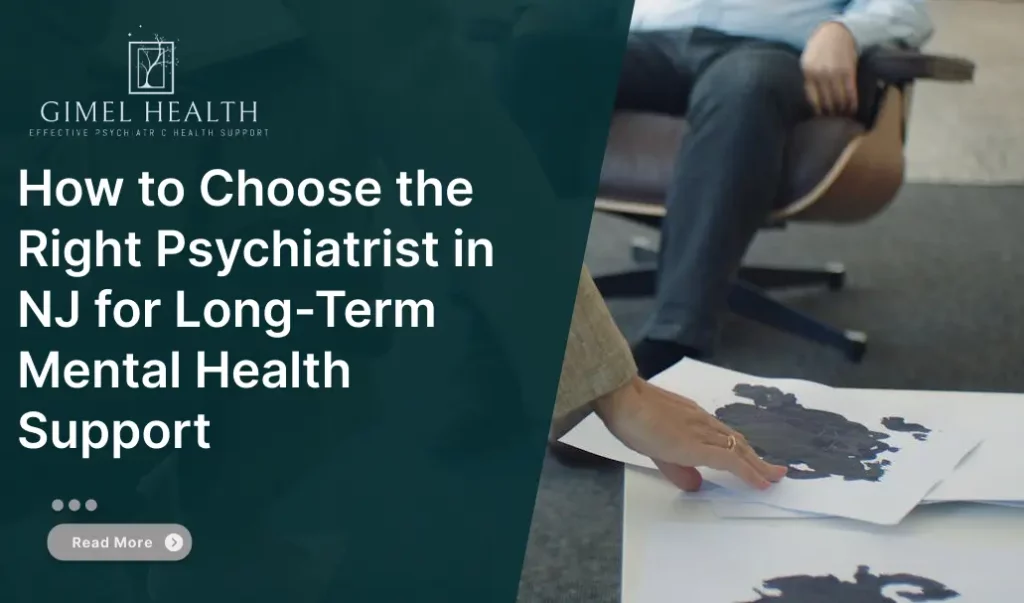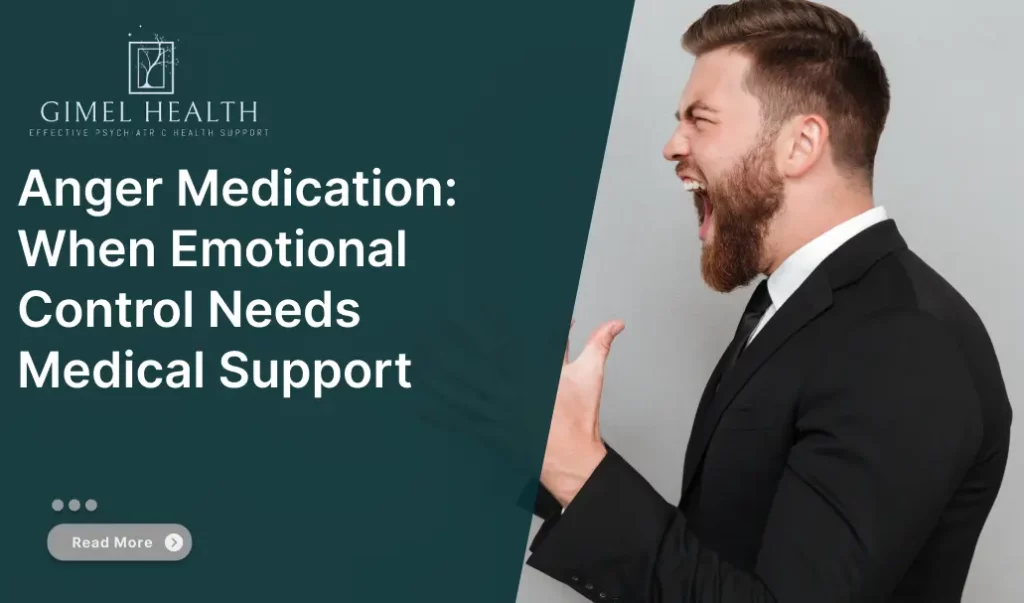
What to Know About Anxiety Treatment in NY When You’re Seeking Personalized Care
Anxiety is one of the most common mental health challenges facing adults and professionals today. If you are seeking anxiety

Here’s something most people don’t realize about depression: it’s not a one-size-fits-all condition. I’ve worked with countless patients who came to me feeling defeated because their antidepressants weren’t working or therapy sessions felt pointless. Many began questioning whether they were somehow “broken” or just not trying hard enough.
If this sounds familiar, you may be experiencing resistant depression, also called treatment-resistant depression (TRD). The name can feel intimidating, but it doesn’t mean you’ve failed. It means your brain needs a different approach than the standard first-line treatments. At Gimel Health, we help people who feel like they’ve hit a wall. Some of our greatest success stories began with patients who believed they had no options left.
Clinically, resistant depression is diagnosed when a person doesn’t improve after trying at least two different antidepressant medications at appropriate doses and durations. Research shows nearly one-third of people with major depressive disorder fall into this category, making it a significant challenge in mental health care.
But clinical definitions don’t capture the lived experience. Resistant depression can bring disappointment after each failed medication and the painful belief that you may never get better. It often leads to guilt when others around you improve while you continue to struggle. The truth is, resistant depression is not untreatable. It simply means your situation requires a more personalized, creative strategy to find lasting relief.

For many people, the first or second antidepressant they try simply doesn’t bring relief. That’s because depression is influenced by multiple factors that standard treatments don’t always address. Resistant depression often develops when several overlapping issues complicate recovery, including the following:
Individual biology matters. Depression manifests differently for everyone, which explains why one SSRI might help your neighbor but not you. Genetics affect how quickly or slowly medications are metabolized, and serotonin receptor variations can change how antidepressants work in your system.
Hidden medical conditions interfere. Sleep apnea, autoimmune flare-ups, thyroid imbalances, and chronic pain can worsen depression or prevent medications from working. Trauma history can also block recovery until it’s addressed through specialized therapy.
Co-occurring mental health conditions complicate recovery. Anxiety, bipolar tendencies, and substance use—even alcohol—can reduce treatment success or make certain medications problematic.
Life stressors act as barriers. Relationship struggles, financial strain, and chronic work stress keep the body in a constant state of fight-or-flight, making it harder for antidepressants or therapy to work effectively.
When resistant depression develops, it usually isn’t due to one single issue. Instead, it’s the result of several factors combining and creating obstacles that standard treatments alone cannot overcome.
You can always take a Depression Evaluation to get a professional diagnosis.
The good news is that treatment options extend far beyond repeating the same prescriptions. Medication optimization may involve dose adjustments, switching to new depression medication, or combining drugs with different mechanisms. Augmentation strategies, such as adding mood stabilizers, thyroid hormones, or atypical antipsychotics, can increase effectiveness.
Psychotherapy plays a crucial role in resistant depression. Approaches like cognitive behavioral therapy (CBT) and acceptance and commitment therapy (ACT) address negative thinking and build long-term coping strategies. For harder-to-treat cases, advanced therapies can be life-changing. TMS stimulates underactive brain regions, esketamine nasal spray works on different pathways, and ECT remains one of the most effective alternative depression treatments available. Lifestyle changes such as exercise, sleep regulation, and nutrition provide the foundation for recovery.

At Gimel Health, we know resistant depression requires more than quick fixes or short-term solutions. Our approach begins with a deep evaluation and continues with care that adapts until we find what truly works for you. Here’s how we build personalized treatment plans:
Comprehensive evaluations. We carefully review your treatment history, medical conditions, and co-occurring mental health concerns. Many patients discover overlooked contributors such as vitamin deficiencies, hormonal imbalances, or inflammatory conditions that made previous treatments less effective.
Integrated treatment plans. Our personalized strategies often combine advanced therapies like TMS or ketamine treatment with psychotherapy and carefully adjusted medication regimens tailored to your unique needs.
Whole-person care. We address biology, psychology, and lifestyle together, ensuring lasting recovery by treating every factor that influences your mental health.
Persistence and adaptability. Unlike approaches that stop after a few failed attempts, we keep refining and adjusting until we find the combination that delivers real progress.
This persistence and creativity are what set Gimel Health apart. We are committed to supporting patients with resistant depression until meaningful improvement is achieved.
Resistant depression can feel discouraging, but it is not the end of the road. Recovery may not always be quick or linear, but many patients improve dramatically once they receive the right combination of treatments. I’ve seen people transform after years of frustration, finally finding relief when care was tailored to their unique situation.
Mental health treatments are advancing rapidly. With new medications, innovative therapies, and deeper understanding of brain chemistry, breakthroughs are more possible than ever. If standard approaches haven’t worked for you, it may be time to explore specialized care designed for medication-resistant depression.
Contact Gimel Health today to schedule a consultation and discover the personalized approach that could finally provide the relief you’ve been searching for.

Anxiety is one of the most common mental health challenges facing adults and professionals today. If you are seeking anxiety

Finding the right psychiatrist NJ is one of the most important decisions you can make for your long-term mental health.

Anger is a normal emotion, but when it becomes intense, unpredictable, or destructive, it may signal deeper mental health issues.
Your journey to better mental health starts here. With advanced expertise in biology and psychiatry, I build exclusive medication plans backed by science. Contact me to schedule your initial consultation.
(201) 815-4351
440 West Str, Ste 307, Fort Lee Bergen County NJ 07024
Resistant depression, also called treatment-resistant depression (TRD), is a type of major depressive disorder where symptoms continue after at least two antidepressants have been tried at the proper dose and duration. For many people, it feels like their antidepressant is not working, but with the right care, effective treatment options are available.
You may have TRD if you’ve tried multiple medications or therapy without improvement and still struggle with persistent symptoms. A psychiatrist can confirm this by reviewing your treatment history, considering other conditions such as bipolar disorder, and screening for physical health issues that may contribute to chronic depression.
Treatment options include switching to another medication, combining antidepressants, or using augmentation strategies such as mood stabilizers or thyroid hormones. For harder-to-treat cases, advanced therapies like TMS, ECT, or esketamine therapy are often recommended. These approaches are considered some of the most effective alternative depression treatments for people with resistant depression.
Yes. Psychotherapy remains very helpful for treatment-resistant depression. Approaches like cognitive behavioral therapy provide tools to manage stress, identify negative thinking, and build healthier coping habits. When paired with medication or advanced therapies, psychotherapy offers long-term support that helps prevent relapse.
Yes, resistant depression can improve with the right combination of care. Many people find relief through personalized plans that may include new depression medication, psychotherapy, and advanced treatments like TMS or ketamine therapy. With persistence and professional support, it is possible to move forward and overcome medication-resistant depression.
No. Resistant depression does not mean recovery is impossible. It simply indicates that first-line treatments have not worked. With access to advanced care such as esketamine treatment, TMS therapy, or alternative depression treatments, many people experience significant improvement in mood and quality of life.
Research suggests that about one-third of people with major depressive disorder experience treatment-resistant depression. While this may sound discouraging, it also means that TRD is well studied, and there are established pathways to explore when standard antidepressants are not working.
You should seek professional help if you’ve tried at least two antidepressants or therapy approaches without meaningful improvement. Early intervention with a specialist increases the chances of success, especially when exploring alternative treatments for resistant depression such as TMS or ketamine therapy.
Yes. Treatments such as transcranial magnetic stimulation and esketamine nasal spray are FDA-approved for resistant depression and are carefully monitored by healthcare providers. Side effects are generally mild, and both options have helped many people whose depression did not respond to standard medications.
We use cookies to improve your experience on our site. By using our site, you consent to cookies.
Manage your cookie preferences below:
Essential cookies enable basic functions and are necessary for the proper function of the website.
These cookies are needed for adding comments on this website.
Google reCAPTCHA helps protect websites from spam and abuse by verifying user interactions through challenges.
Google Tag Manager simplifies the management of marketing tags on your website without code changes.
Statistics cookies collect information anonymously. This information helps us understand how visitors use our website.
Vimeo is a video hosting platform for high-quality content, ideal for creators and businesses to showcase their work.
Service URL: vimeo.com (opens in a new window)
You can find more information in our Cookie Policy and Privacy Policy.